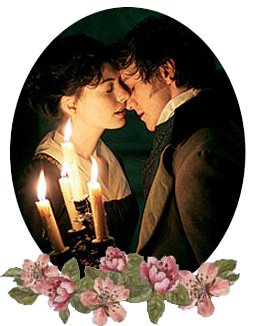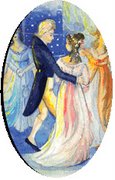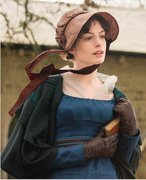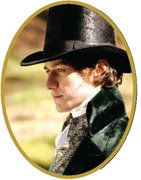My take on 'Miss Austen Regrets'
 It’s a long delay, but I finally saw Miss Austen Regrets (MAR) a few nights ago, and now would like to offer you dear friends my review. First of all, I have to admit that this review will not be as balanced as I want to, because of my personal preference to Becoming Jane (which has mixed acceptance, I understand), so I apologise in advance if I offend anyone in the process. I started watching MAR with as open mind as possible. I wanted to like the movie; mostly because I don’t want my love to BJ prevents me from enjoying another interpretation of Jane Austen’s life. It’s unfair for me to do so, and it would block my attempt to understand those who disagree with my views.
It’s a long delay, but I finally saw Miss Austen Regrets (MAR) a few nights ago, and now would like to offer you dear friends my review. First of all, I have to admit that this review will not be as balanced as I want to, because of my personal preference to Becoming Jane (which has mixed acceptance, I understand), so I apologise in advance if I offend anyone in the process. I started watching MAR with as open mind as possible. I wanted to like the movie; mostly because I don’t want my love to BJ prevents me from enjoying another interpretation of Jane Austen’s life. It’s unfair for me to do so, and it would block my attempt to understand those who disagree with my views.
I found out that I was in love with the colours, the scenes, the tones of the movie. I also love the fact that many Austen ‘supporting characters’ from Edward Austen to Reverend James Stanier Clarke appeared in the movie. JS Clarke by the way, was Prince Regent’s chaplain and librarian who drew a mysterious sketch of a sweet young woman, later to be confirmed as the Jane Austen herself. Hey, we also saw the timid Revd. Papillon whom Jane flirted with several times. And of course, the famous Mr. Harris Bigg-Wither, heir to
Talking about Jane Austen in MAR, I have to first talk about Olivia Williams. I admire her acting in MAR, more than I was amazed by her ‘tiny’ role as Jane Fairfax in Emma 1996. Ms. Williams showed me a very lively Jane Austen, a writer so full of life that so many a young and old men fell for her. I thank Ms. Williams for that. Other supporting characters, including Greta Stacchi (Mrs. Weston in Emma 1995) who played Cassandra Elizabeth Austen, were also admirable. No complains whatsoever acting-wise.
But then, enters Fanny Knight (later Knatchbull) and I was amazed at how this very niece of Jane Austen was used as the main supporting character (more than Cassandra Austen herself) who helped the tapestry of the movie. I understood from JA’s letters, and also from a friend here Arnie, that Fanny Knight was supposed to be JA’s favourite niece. But from JA’s later letters and my discussions with Arnie, I believe that JA’s favourite niece was actually Anna Austen Lefroy (married to Benjamin Lefroy, Tom Lefroy’s cousin). Anna was the only one in the Austen family that was not sceptical or bitter towards Jane’s past story with Tom Lefroy. Why, Anna married a Lefroy then, and her daughter (Anna Jemima Lefroy) later married Thomas Edward Preston Lefroy (son of Anthony Lefroy, Tom’s younger brother). Anna was a believer of love, and she understood Jane Austen completely. (On this note, Mariana found something on Jane’s later letter that might proof the importance of Anna Austen Lefroy in Jane’s life, even after so many years. I hope to find a decent time to post her findings.)
Okay. So MAR used Fanny Knight instead of Anna Lefroy (who, thank God, appeared in the movie to introduce baby Jemima to Jane Austen). I will go for that. But then appeared 4 to 5 men (I lost count already) in less than 2-hours movie, saying that they admired Jane Austen, but then nothing was to be done with those men. Some of them had wives already (e.g. Rev Brook Bridges), some just harmless flirtation… and one physician (Dr. Charles Thomas Haden) particularly flirted with Miss Austen long enough to make us believe that there would be something there (though wouldn’t last, because we knew JA never married).
True, there was nothing. For young and smart Dr. Haden (he was one of the first users of stethoscope, how cool was that?) then flirted with Fanny Knight and left Jane jealous and insecure with her spinster status.
And there lies one of my problems with this BBC drama. I am an avid believer of Jane Austen and Tom Lefroy, all of you know that. But I also acknowledge that Tom Lefroy and Mary Paul had a happy marriage. I used to have difficulties in accepting that; but not anymore. There is a difference between keeping a fond memory of old sparks and turned it into a more chaste admiration while at the same time having a good family life, and another one: keeps regretting what happened and not being sincere with your present life. I think Tom Lefroy finally chose the first option, and I respect him (and Jane Austen) for that.
With that note, and considering the many letters of Jane Austen that actually did indicate her inclinations towards several other men post-Tom Lefroy, I do believe that Jane did try (unconsciously, or to some degree consciously) to find another heart for her. To some extend she did, as proven by the letters. She also did not, as she remained unmarried. So what MAR tried to explain here has a grain of truth. Jane Austen did ‘have’ a considerable troop of lovers and admirers. But she remained single, and why? This ‘why’ was not properly explained by MAR. It’s okay, that’s not even a problem for me, for it’s very hard to know the true answer.
As I said, that is not my problem. My problem is that this production makes Jane Austen a bitter woman who constantly felt sorry for what she was, for what she believed in (i.e. not marrying without affection). No, she didn’t regret NOT marrying Bigg-Wither. She regretted that she could not provide a secure income for her sister and mother, and hence would leave them poor and destitute when she died. Perhaps her regret happened because at that time Henry Austen’s bank collapsed, Edward Austen faced a law case, and Jane herself was getting ill, with not enough money for medical attention &c. Okay, I might be able to accept that, based on the movie’s storyline.
But did Jane Austen truly regret? Guaranteed, at any points of our lives we do regret. Then we contemplate again and again, and arrived at the conclusion that – despite whatever that would happen – we did not regret taking that action. Because if we took another course, the consequence would be worse, or our pride or faith would have been compromised.
Alas, I don’t have my hardcopy of JA letters here to check her last letters. But if my memory serves me right, I did not detect any regrets in her last letters. She accepted her illness and imminent death with grace and courage I hope I will have when I face my own end. She fell asleep on Cassandra’s lap and left this world peacefully, like an innocent child. She did not regret her decisions in life, the way Tom Lefroy did not regret his.
And, Tom Lefroy aside, was that awareness present in the MAR? That Jane Austen was a woman of pride and faith, a strong woman that believes in herself, in her chosen path, no matter how bitter, rocky and thorny it was? True, granted, she would fell into despair now and then, only to be reminded again of her decisions and faith in herself, and she would definitely sprung up to life again, embracing her disappointments and sadness, to be a better person. NOT a bitter person.
That is not the Jane Austen I saw at the end of MAR. I saw a regretful and bitter Jane Austen who kept hurting herself with her despair. I don’t say that the movie should not show her downfall and sadness; nay, those made her more humane. But must the movie end Jane’s scene with her crying, wailing at the backyard for her demise? Can’t it end gracefully with her accepting all her contradictions and making peace with her past? That true, it hurt, but life must move on, and Jane herself moved on too?
I’m not saying that one of the major premises of the movie (i.e. the need of money to guarantee happiness – just look at Fanny’s marriage to Mr. Knatchbull) is 100% incorrect. But it should not be the major thing. I’m a fool if I say that I don’t need money to type this review (where would my laptop and internet connection come from?). But I’m also a fool if I believe that the latest model of Mac or iPod (or a great house with horses in Jane Austen’s world) will satisfy my happiness. To a certain degree, yes, I need money. Everyone does. But above that, we need our faith, love, and pride. We need to believe in what we do, in our chosen path, with all its flaws and blemishes. Based on those, we move on.
Many Austen fans were insulted by what Becoming Jane presented at the last scene; i.e. Jane Austen looked pensively yet lovingly at Tom Lefroy, and received the same look in return. It is an offence because a great writer like Jane Austen should not hold onto an old rugged fling like that. Whatever for; she did not receive anything in return, right? It’s as if nurturing an unconditional love equals to begging for attention or being a submissive and weak woman.
So, unconditional love is wrong. Yet, bitterness and constant regrets is acceptable?
I am a mid-30s single woman living in a patriarchal society who sees single women (and single mothers) as alien species from another universe. I look up to Jane Austen as one of the rare examples of classical women (i.e. born before the 20th century) who dared to challenge society’s established views and lived alone, unmarried. Two hundred years have passed, and still the social conditions in many places of the world remain the same for women. Respectable women are only those who married, or at least have spouse. Then and only then, they are secured and protected from society’s judgement that there is something utterly and incredibly wrong with them for choosing not to marry, or simply not yet married nor having partners. Then and only then they are protected from the constant sexual harassment (directly or veiled) launched at them for they are still single, and hence harassment is permitted. If it is still hard for me to live in such a world, then what kind of horrors Jane Austen faced daily back then? Spare me the gory details, I don’t want to know.
Now my dear friends, do you see why I am dismayed with this production? If I have to choose between: a) “being single and still maintaining unconditional love, no matter how unreturned it was” to b) “being single and bitter with man’s world and the world in general”, I will wholeheartedly choose the first option. True, it is personal. But is it not true that most of Jane Austen’s thematic issues were about personal relationships anyway?
Guaranteed, BJ has many historical inaccuracies; I admit that. Our findings here so far have confirmed that what happened between Jane and Tom was not truly as portrayed in BJ. But it did not change the fact that I still love BJ.
For all its flaws and blemishes, BJ still presents me with hope and faith for unconditional love, no matter unrequited it has been. That whatever disappointments Life present you, you can still move on to be a better person; not a bitter one. That is the choice we should make every day, every moment of our lives. On the other hand, MAR shows me bitterness and regret, something that I prefer to live without for the rest of my life.
Regretfully, I dislike Miss Austen Regrets.
Pic 1: Olivia Williams (Jane Austen) and Imogen Poots (Fanny Knight), from BBC Drama
Pic 2: Imogen Poots (Fanny Knight) from Miss Austen Regrets.com
Pic 3: Williams, Poots, and Greta Scacchi (Cassandra Austen) from Miss Austen Regrets.com














































10 comments:
You did find the right balance in your review, dearest Icha; it’s beautifully, respectfully and truthfully written.
I know my opinion could be judged as well because of my partiality for BJ, but I did watched MAR few times not just once, trying as you said to be open to other interpretations, to see what others liked about this movie. Although I did not disliked the movie in totality – and my reasons are pretty much matching those highlighted by you, each time I’ve watched it I felt sad to see Jane portrayed like an unhappy woman, full of bitterness and never ending regrets… I could not find such image to be true to her surviving letters -as it’s said the screenplay has been based on.
Infinity of Love
Do some serious study of Austen's life one of these days (that does not count what Hollywood would have you believe.)
You have so many facts wrong in this post.
Icha, I completely agree with you. In MAR, JA does not seem to be the strong of mind, insightful, and very very vibrant woman we believe her to be, because of all that "bitterness and reget". Also, I agree with your point about belief in unconditional love and the path you've chosen. Lord Tennyson put it so well in that famous quote:
from In Memoriam:27, 1850:
I hold it true, whate'er befall;
I feel it, when I sorrow most;
'Tis better to have loved and lost
Than never to have loved at all.
Thanks.
Haha! Jeanette, I knew I would offend some of the Austenites per my earlier disclaimer. But I have said sorry in advance, and if you're still offended, well, what can I do?
Re: research, could you pls point out what I have done wrong? Which fact(s) have I missed? Surely I might miss something, but if the myriad research conducted in this blog is not sufficient to your taste, I also cannot do anything about it.
Anyway, thanks for dropping by, though you dislike my review. Very healthy of you.
Dear Icha,
I'm very glad to find that you and others are not well disposed toward MAR. When Rachel issued an invitation for opinions on MAR in April, I resisted because I did not want to offend people with my negativity. Quite aside from its discrepancies with the wonderful BJ, I found MAR to be an unrelieved downer totally at odds with the JA revealed even in her last letters. With regard to the 'comment' of Jeanette, please do not concern yourself. Someone who makes such an unsupported blanket criticism does not deserve the compliment of rational opposition. No true Austenite/Janeite would be offended by your review, but must have been so by MAR.
Bilbo
Dearest Icha,
Brava! I have no complaints with your review!
I have MAR on tape, and I think in all the hustle and bustle of my life, I forgot to view it. Now I shall have to find time to do so. Pitiable mess, I am.
As for Jane's "regrets", I see her as a Christian who lived by Romans 8:28. Another thing, in Persuasion it is written that Anne "prefers" Captain Wentworth over the others. In my heart, it gives me comfort to believe that Jane "preferred" Tom when compared to those "other" choices, because when you truly 'know' Tom - the intelligent, Christian Tom - I prefer him also. Thanks so much for your lovely review.
Yrs aff'ly,
Linda the Librarian
Linda, thanks a lot, and let me know what you think of it. You're entitled to your own opinion, so pls don't let what I've wrote influence you.
Bilbo, thanks a lot dear friend. I have to admit I was a bit scared to post this review; it was so negative to me that I needed to text Michelle down in NZ to ensure that I have the right to write. It's a different thing to write positive things about BJ; I do that because I love it wholeheartedly.
But writing a negative review is something not easy for me, and it still is not till now. But I have to be honest, so there you go. I still respect the makers of MAR and its entourage; but I disagree with their views.
Besides, the world is in such a trouble now with earth quakes, floods, storms, violence etc everywhere, I feel inappropriate to clash with MAR supporters like this over something that is important (JA) but not urgent to date. But MAR has hit something personal for me, and hence the review.
Wow...what a review and what a set of varied comments to go with it!
Firstly, you may have noticed that after viewing MAR in the UK, I did an 'anticipation' post but I did not follow it up with a full review. To my shame it was because I thought I must be the only person in the world who did not possitively appreciate the production. Now that you have written this review Icha I feel relieved.
I do think that we have a somewhat romantic perspective on Jane's unconditional love and 'what might have been' status but I do also feel that MAR made Jane bitter and did not reflect the temperament and mood of the final letters that I read. I think of Jane as vibrant until the end.
As for Jeanette above, I really do urge you to point out the facts in the post which you believe to be wrong. We, on this site, welcome all opinions, positive and negative, but what we do ask is that they be backed-up.
We really appreciate your comments Bilbo, they are so thorough so thank you very much.
You said above Icha that this has struck something quite personal within you.....I can see that!
Thank you dearest for the post.
Dearest Icha,
I did finally view MAR, and still agree with you. The scenery was lovely - made me remember my short visit to Winchester and Chawton five years ago. I did have to do a bit of rereading of Jane's Letters to find out who was who in the movie. So I see I still don't know enough, but I'm learning.
Linda the Librarian
Jane want marriage, but did not get one. That's her tragedy.
Post a Comment